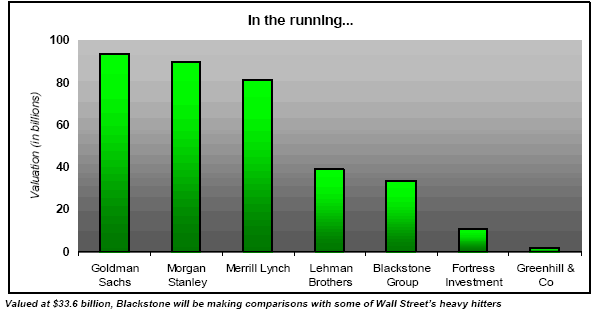| China Invests in Blackstone Group |
| By John Kicklighter |
Published
05/22/2007
|
Currency , Futures , Options , Stocks
|
Unrated
|
|
|
|
China Invests in Blackstone Group
On Monday, Beijing announced a deal that surprised the finance community, and it didn’t involve commodities or the domestic currency. Instead, officials, on the cusp of creating an private investment arm, invested a significant amount in the private equity firm Blackstone Group LP. The deal has subsequently boosted the overall filing as the Chinese government seeks out financial returns on its rather lackluster foreign exchange reserves. Although widely pertinent to the equity markets, the planned offering does have subsequent implications in the FX world with many looking ahead to further potential acquisitions and investments on the horizon.
Details of the Transaction
Looking for higher rates of return, the Chinese government has elected to invest a heavy sum into the proposed Blackstone Group initial public offering, set to come to market in a couple of months. The stake, worth 9.9 percent of the overall deal, has subsequently forced lead underwriters to boost the capacity of the offering, setting shares in the $29-$31 range. Shortly after the announcement, deal makers increased the deal by almost 20 percent to as much as $7.8 billion. Laden with plenty of additions and clauses, the final transaction markup will value the soon to be public private equity firm at a whopping $33.6 billon. Ultimately, the total will boost Blackstone’s carry in the financial services industry, making comparisons with some of Wall Street’s heavy public hitters like Goldman Sachs and Morgan Stanley.

Is There Anything Else In The Works?
But are we to expect more investments like this in the near term? More than likely it seems. Although some consider the deal with Blackstone to be the beginning of a growing trend, Chinese officials have already been eyeing certain deals in the past, noting the 2005 completion of Lenovo’s bid for IBM’s personal computer branch. The deal, at the time, worth $1.25 billion, helped to spark rising interest in the fact that Chinese companies, as well as investors, may be taking aim at what the world’s largest economy has to offer. However, the ease of such deals will likely come under pressure as did the previous 2005 proposition made by CNOOC Ltd. Forced to dump the proposed $18.5 billion bid for Unocal Corp., the Chinese offshore oil producer caved in on stiff opposition from US policy makers considering the acquisition a breach of national security. Nonetheless, with approximately $200 billion in reserves, the new state investment agency will likely take aim at notable bellwether companies, with stock issuances that are more liquid. This may include investments in key branding items with access and connections to US consumers and distributions through domestic stores. However, a bulk of sentiment continues to side with the notion of energy and internationally related companies as the preferred target. One thing is for sure though, with a heavy investment in Blackstone, Chinese officials will be able to reach out to other investments, taking advantage of the firm’s worldwide exposure.
What Does This Mean for FX Markets?
As with any other deal, on the level of mergers and acquisitions, the US dollar may receive some support from this and other potential future transactions. Chinese officials will no doubt have to exchange domestic yuan for the US dollar in order to complete these deals, ultimately boosting the demand for the US dollar in the short term. As a result, the outflow of Chinese yuan will likely balance the inflows of foreign direct investment and any speculation on the currency, helping to alleviate a rapid appreciation of the yuan. Subsequently on a longer term plan, Chinese government officials will also likely be slowing down their purchases of US treasuries in order to enforce the now widened currency band. Ensuring the two way traffic of the domestic currency may ultimately deter increasing amounts of speculation, which is currently driving the yuan to a 6 to 1 exchange against the US dollar.
Richard Lee is a Currency Strategist at FXCM.
|